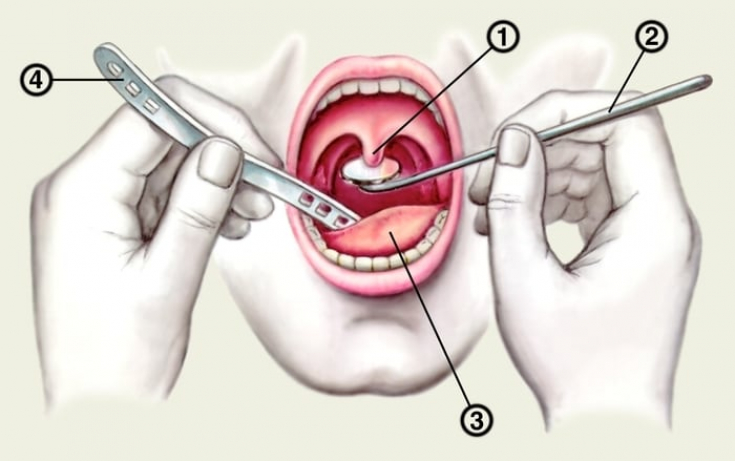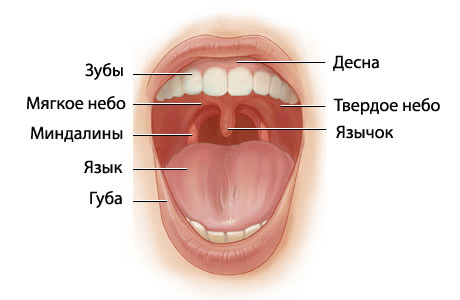The horizontal partition separating the oral and nasal cavities, called the palate, only at first glance seems to be a very modest organ of the human body. In fact, the palate is involved both in articulation and in the process of chewing food, so its role for our body is very valuable.
That is why if you have a swollen palate in your mouth and it hurts to swallow or you have a burning sensation of the upper palate, we do not recommend ignoring these common symptoms.
Inflammation of the upper palate should not be underestimated and left to chance. Where does it come from and how to treat it – read our article.
Where does inflammation of the upper palate come from
The range of causes that can trigger an inflammatory process in the palate is very wide and varied. Moreover, among them there can be both completely innocent (for example, irritation of the mucous membrane from frequent smoking), and very serious (oncology). So to hope that "everything will go away on its own", if there are no visible external reasons that the palate in the mouth is swollen, it's definitely not worth it.
Obvious causes of inflammation of the upper palate:
- Burns due to eating too hot food or drinks (in this case, burning of the upper palate will also join the symptoms).
-Mechanical damage to the palate mucosa (for example, scratches from solid food food – for such cases, inflammation of the palate near the front teeth is typical).
- Irritation of the palate mucosa due to prolonged or frequent smoking.
- Dental problems.
-stomatitis.
Another obvious reason – when inflammation of the palate becomes one of the first signs of an infectious throat disease (for example, if the palate is swollen and painful to swallow, then it is likely that a sore throat or another disease will soon begin).

More serious causes of inflammation of the palate:
-Allergy (if it is seasonal, a person gets used to the sensation of swelling and burning of the upper palate, but if the allergic reaction is acute, then, as a rule, a person cannot navigate).
- Fungus.
- Tumors.
Also, inflammation of the upper palate and its swelling can be an indirect sign:
- Facial neuralgia.
- Osteomyelitis.
- Leukoplakia.
Depending on the accompanying symptoms, it is possible to determine the nature of the inflammatory process and methods of treatment.
Concomitant symptoms of inflammation of the palate:
- Pain that gets worse with time.
- Painful and difficult to swallow.
- Swelling, swelling.
- Redness.
- White plaque (characteristic of a fungus).
- Bad breath (the same thing).
- Erosions and sores on the palate and other places in the oral cavity.
- High body temperature (indicates about a throat infection).
- Ulcers on the mucous membrane (evidence of either purulent tonsillitis or the penetration of dangerous bacteria into damaged areas).
- Toothache, redness and pain in the gums (if it is a problem with the teeth).
- Seals, tumors.
- General weakness.
Inflammation of the upper palate: treatment with medicines and home remedies
Of course, if you suspect that inflammation of your palate is not just due to mechanical damage or irritation, then you should consult a doctor.
See an otolaryngologist (ENT) if you suspect tonsillitis or other throat infections. If you know that problems with your teeth may be to blame for everything – go to the dentist.

If you don't know what could have caused the inflammation of the palate, then the best option would be to initially contact a therapist who, after examination and tests, will direct you further.
Read also: Inflammation of the palate: symptoms, causes, treatment
Depending on the source of the disease, the patient may be prescribed topical and general anti-inflammatory drugs, antibiotics (if it is an infection), antipyretic drugs, and analgesics if the discomfort is severe. In the presence of sores and wounds on the palate, local antiseptics cannot be dispensed with.
If you are firmly convinced that your palate is swollen in your mouth solely because of very hot tea you drank the day before, or eaten crackers or a hard apple, then you can try to relieve the inflammation of the upper palate with home methods.
If you have a burn on your palate, rinse your mouth with cool water (long until the pain subsides). But the water should be cool, not icy!
You can rinse your mouth with herbal infusions. The most popular herbs with anti-inflammatory effect – chamomile and sage. They can be purchased at any pharmacy.
To prepare chamomile infusion, pour a tablespoon of flowers with a glass of boiling water and let it brew for 15 minutes. Sage leaves should be brewed in the same proportion, but insist longer – up to half an hour.
Rinse your mouth with chamomile or sage at least 2-3 times a day. Monitor fluid temperature – the infusion should be warm, but never hot!
If the damage includes wounds, you can smear them with sea buckthorn or rosehip oil for faster healing. However, first make sure they are decontaminated.
As you can see, sometimes inflammation of the upper palate can be cured on its own if it is caused by external factors. In other cases, do not hesitate to contact the doctors and do not risk your health by self-medicating. And remember: the more carefully you follow the rules of oral hygiene, the less the risk of inflammation of the palate.






Add a comment